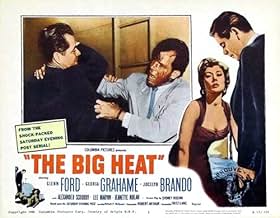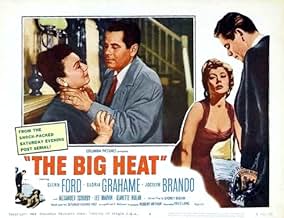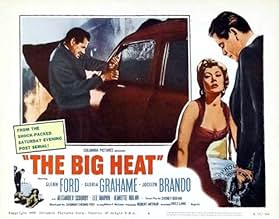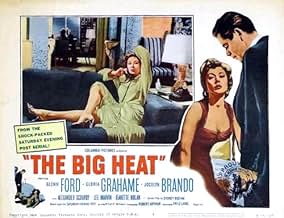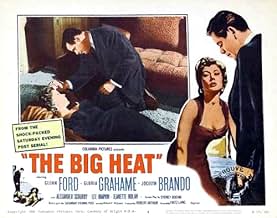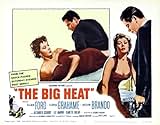AVALIAÇÃO DA IMDb
7,9/10
31 mil
SUA AVALIAÇÃO
Dave Bannion, um policial duro, assume um poderoso sindicato do crime político.Dave Bannion, um policial duro, assume um poderoso sindicato do crime político.Dave Bannion, um policial duro, assume um poderoso sindicato do crime político.
- Direção
- Roteiristas
- Artistas
- Prêmios
- 2 vitórias e 2 indicações no total
- Direção
- Roteiristas
- Elenco e equipe completos
- Produção, bilheteria e muito mais no IMDbPro
Avaliações em destaque
Fritz Lang can conjure up a paranoid thriller with the greatest of ease (actually, it's probably a lot of work, but it looks easy, which is a feat unto itself), and The Big Heat provides some of his classic paranoia to the proceedings of a story of a good, hard cop on the trail of a case that's gone way too corrupt. There are simple visual touches, amid what looks like a standard-shot thriller (when compared to, say, M, which is Godly in its vision of the darkness of humanity's layers peeled back). But it's got the kind of grit to it that most likely inspired Dirty Harry, even if, arguably, Glenn Ford isn't quite as great a star as Clint Eastwood. He's got a style to himself, anyway, like someone who is almost TOO good, and knows it, which is why he'll get the job done even if it means some busted knuckles and a few cracked heads. He's a compelling force as Dave Bannion, and he's perfectly cast against a bunch of sinister, slimy characters (save for the women, and even one of them is just rotten).
After a cop seems to have killed himself, the case looks open and shut. But there seems to be more for Bannion, as he didn't seem like a guy, from some accounts, to do himself in. Turns out there's a big cheese named Lagana who wants this put hush-hush like, and pays off the widow to keep a letter he wrote under wraps. But Bannion is suddenly put to the test, if only of himself, when his family is put in danger (with, of course, tragic results). Lang doesn't stop for a detail that isn't worthy of the attention of the narrative, and there's a connection that he makes between the world of the criminal underworld and the law: it's a place where there's some gray, but the black and white aspect rings through due to the situation at hand: corrupt cops, dirty criminals, and only a couple of dames to trust in the mix of it (one of them Debby, played in another great turn by Gloria Grahame, takes a savage incident with a pot of coffee via Lee Marvin's hand to wise up).
It might not have the depth of an M or Scarlett Street, but the Big Heat is about as solid a genre piece as one could ask for, getting more harrowing from the first gun shot of the picture all the way to the final moment when Bannion leaves the office for a hit-and-run case (a cop's work is never finished, one might suggest). It's also got more intelligence for its conventional roots with the little things; for example, there's a point in the movie where something pivotal could've happened with Bannion's daughter and the thugs, but Lang makes a good step to push aside it, keeping the focus squarely on the task at hand instead of sidestepping the climax into cliché. Land understands how, for the sake of a piece of pulp fiction like this, to keep the lines in order, even if it might seem standard for today: keep Bannion's family wholesome, maybe TOO wholesome, with stories of three little kittens, and keep the criminal elements savage, sinister in their grins and suits and violence brimming underneath.
One things for sure, it doesn't get much less thrilling than seeing Ford and Marvin in an unpredictable shoot-out. A+
After a cop seems to have killed himself, the case looks open and shut. But there seems to be more for Bannion, as he didn't seem like a guy, from some accounts, to do himself in. Turns out there's a big cheese named Lagana who wants this put hush-hush like, and pays off the widow to keep a letter he wrote under wraps. But Bannion is suddenly put to the test, if only of himself, when his family is put in danger (with, of course, tragic results). Lang doesn't stop for a detail that isn't worthy of the attention of the narrative, and there's a connection that he makes between the world of the criminal underworld and the law: it's a place where there's some gray, but the black and white aspect rings through due to the situation at hand: corrupt cops, dirty criminals, and only a couple of dames to trust in the mix of it (one of them Debby, played in another great turn by Gloria Grahame, takes a savage incident with a pot of coffee via Lee Marvin's hand to wise up).
It might not have the depth of an M or Scarlett Street, but the Big Heat is about as solid a genre piece as one could ask for, getting more harrowing from the first gun shot of the picture all the way to the final moment when Bannion leaves the office for a hit-and-run case (a cop's work is never finished, one might suggest). It's also got more intelligence for its conventional roots with the little things; for example, there's a point in the movie where something pivotal could've happened with Bannion's daughter and the thugs, but Lang makes a good step to push aside it, keeping the focus squarely on the task at hand instead of sidestepping the climax into cliché. Land understands how, for the sake of a piece of pulp fiction like this, to keep the lines in order, even if it might seem standard for today: keep Bannion's family wholesome, maybe TOO wholesome, with stories of three little kittens, and keep the criminal elements savage, sinister in their grins and suits and violence brimming underneath.
One things for sure, it doesn't get much less thrilling than seeing Ford and Marvin in an unpredictable shoot-out. A+
Coming full cycle, Hollywood seems to be back on the theme of good cop vs. bad cops controlled by the mob. Recently "16 Blocks" successfully pitted honest Bruce Willis against dishonest city hall. For a time, with "The Big Easy" being an early example, this type movie presented the image of a totally corrupt government from top to bottom with omnipresent mob ties indicating cynical times, even the one good cop being tainted, just not as much as others. "The Big Heat" is a prime example of this type film in the early Cold War period, emphasizing the importance of one good man standing up against all odds, in particular unconcerned citizens who either themselves become tainted or who are simply apathetic as long as they are left alone. "The Big Heat" like "High Noon" showed that the good must take a stand or the entire house will come crumbling down with the rodents taking over.
Glenn Ford was never a versatile actor. In the right role he could carry the load sufficiently to get by. In the wrong role, his acting was amateurish. That he had potential is indicated by his performances in two movies, "Gilda" and "The Big Heat." Arguably, his role as Det. Sgt. Dave Bannion is the better of the two. Perhaps it is the inimitable director Fritz Lang that prods Ford on to realize his true talents. There is no doubt that Ford makes Sgt. Bannion come alive and puts real flesh on his bones. Ford is so good in this film and in "Gilda" that he deserved more recognition than he got from the Hollywood big wigs.
The two shining performances are given by Gloria Grahame and Lee Marvin who run away with the show. They provide one of the legendary scenes in film history that just about everyone has either seen or read about, when Vince Stone (Marvin)--note the last name of Stone--pitches a container of boiling coffee into Debby Marsh's (Grahame) face, scarring her for life. Vince Stone's demise is also memorable. The coffee sequence alone is worth the price of admission.
Glenn Ford was never a versatile actor. In the right role he could carry the load sufficiently to get by. In the wrong role, his acting was amateurish. That he had potential is indicated by his performances in two movies, "Gilda" and "The Big Heat." Arguably, his role as Det. Sgt. Dave Bannion is the better of the two. Perhaps it is the inimitable director Fritz Lang that prods Ford on to realize his true talents. There is no doubt that Ford makes Sgt. Bannion come alive and puts real flesh on his bones. Ford is so good in this film and in "Gilda" that he deserved more recognition than he got from the Hollywood big wigs.
The two shining performances are given by Gloria Grahame and Lee Marvin who run away with the show. They provide one of the legendary scenes in film history that just about everyone has either seen or read about, when Vince Stone (Marvin)--note the last name of Stone--pitches a container of boiling coffee into Debby Marsh's (Grahame) face, scarring her for life. Vince Stone's demise is also memorable. The coffee sequence alone is worth the price of admission.
An honest, family man cop with a wife and daughter is put onto the investigation of another cop's suicide. He closes the case as suicide due to ill health. However when a women tells him another story and is promptly killed, Bannion just investigates further to find that powerful criminals and powerful politicians share the same table at dinner. When his family is split in an attack meant for him he loses his job and becomes bitter he starts to become more like his enemies as he pursues them.
This is a hardboiled thriller that would still stand up today as a tough film violence and attitudes that make it feel more modern than it is. The story follows the descent of family man Bannion into violence and bitterness when he not only loses what is important to him, but when he finds that corruption at high levels has fed down into rank and file officers causing him to stand out when he tries to catch a criminal.
The brutality of this film shouldn't be underestimated Fritz Lang is no softy! Here we have women beaten and killed, we have sex crimes, we have a women disfigured by scalding coffee in her face. Of course all these things are unseen but this was the 50's! However it is still powerful and adds to the intensity of the film. The story may well have been done many times now but imagine seeing something like this back then!
The cast are great. Ford descends into bitterness really well and seems at ease as both thug and family man. The female cast are good in different ways but the one that catches the eye is a young Lee Marvin. I suspect Marvin got fame because his coffee attack stuck in people's minds even today he is best know as a tough guy in the movies.
Overall this is well worth hunting out it is still being copied by many video thrillers and it just goes to show that you don't have to show gory or graphic violence on screen to be powerful, gritty or shocking.
This is a hardboiled thriller that would still stand up today as a tough film violence and attitudes that make it feel more modern than it is. The story follows the descent of family man Bannion into violence and bitterness when he not only loses what is important to him, but when he finds that corruption at high levels has fed down into rank and file officers causing him to stand out when he tries to catch a criminal.
The brutality of this film shouldn't be underestimated Fritz Lang is no softy! Here we have women beaten and killed, we have sex crimes, we have a women disfigured by scalding coffee in her face. Of course all these things are unseen but this was the 50's! However it is still powerful and adds to the intensity of the film. The story may well have been done many times now but imagine seeing something like this back then!
The cast are great. Ford descends into bitterness really well and seems at ease as both thug and family man. The female cast are good in different ways but the one that catches the eye is a young Lee Marvin. I suspect Marvin got fame because his coffee attack stuck in people's minds even today he is best know as a tough guy in the movies.
Overall this is well worth hunting out it is still being copied by many video thrillers and it just goes to show that you don't have to show gory or graphic violence on screen to be powerful, gritty or shocking.
Glenn Ford is a police sergeant seeking retribution for the death of his wife in "The Big Heat," a 1953 film that also stars Gloria Graham and Lee Marvin. While investigating a police officer's alleged suicide, Ford's idyllic family life is ruptured when his lovely young wife is killed in a car bombing intended for him. Some have suggested the similar scene in "The Godfather" was inspired by "The Big Heat." It's certainly possible.
For 1953, the violence is uncompromising, particularly against the female character played by Gloria Graham when she crosses her boyfriend, Lee Marvin, in one of his early roles. Marvin is fantastic as a brute, and this characterization must have done a lot to raise his profile in films.
There are some outstanding performances, including that of Jeannette Nolan as the late officer's wife who knows plenty. Glenn Ford, a handsome, solid actor who seems forgotten now, underplays his role but the coldness and rage he feels is evident as he goes from happy family man to angry avenger.
Excellently directed by Fritz Lang, "The Big Heat" packs a wallop.
For 1953, the violence is uncompromising, particularly against the female character played by Gloria Graham when she crosses her boyfriend, Lee Marvin, in one of his early roles. Marvin is fantastic as a brute, and this characterization must have done a lot to raise his profile in films.
There are some outstanding performances, including that of Jeannette Nolan as the late officer's wife who knows plenty. Glenn Ford, a handsome, solid actor who seems forgotten now, underplays his role but the coldness and rage he feels is evident as he goes from happy family man to angry avenger.
Excellently directed by Fritz Lang, "The Big Heat" packs a wallop.
This is a classic film noir, beautifully directed by Fritz Lang.. Fast paced non stop plot line & action... Glenn Ford is the good guy with some shades of gray/ Lee Marvin is the bad guy and boy is he bad ; roughs up 2 women/ Carolyn Jones at the bar, slams her hand/ and poor Gloria Grahame/ throws hot boiling coffee in her gorgeous face.. This is a very sadistic scene, and very memorable!!Gloria plays her part to the hilt.. one of her greatest screen moments...She made several film noire movies, In A Lonely Place/ Naked Alibi etc. won her Oscar for a serio comedy role in The Bad & The Beautiful/ sang "I Cant Say No" in Oklahoma.. and was almost crushed by an elephant in The Greatest Show On Earth.. she had a great career... and will always be my favorite 50's bombshell...this film is not to be missed/ Great support by Alex. Scourby, Jeanette Nolan and others.. not to be missed !
Você sabia?
- CuriosidadesColumbia wanted to borrow Marilyn Monroe from 20th Century-Fox to play the role of Debby Marsh, but Fox's asking price was too high. Gloria Grahame was cast instead.
- Erros de gravaçãoThe street address for the junkyard on Bannion's list is "101", yet the number "1024" is seen on a large sign over the yard's shed.
- Citações
Debby Marsh: [to Bannion] Oh, well, you're about as romantic as a pair of handcuffs.
- ConexõesFeatured in Caminhos Perigosos (1973)
- Trilhas sonorasIt's a Blue World
(uncredited)
Written by Chet Forrest and Bob Wright
Heard instrumentally during one of the scenes at The Retreat
Principais escolhas
Faça login para avaliar e ver a lista de recomendações personalizadas
Detalhes
Bilheteria
- Faturamento bruto mundial
- US$ 7.083
- Tempo de duração1 hora 29 minutos
- Cor
- Proporção
- 1.37 : 1
Contribua para esta página
Sugerir uma alteração ou adicionar conteúdo ausente



